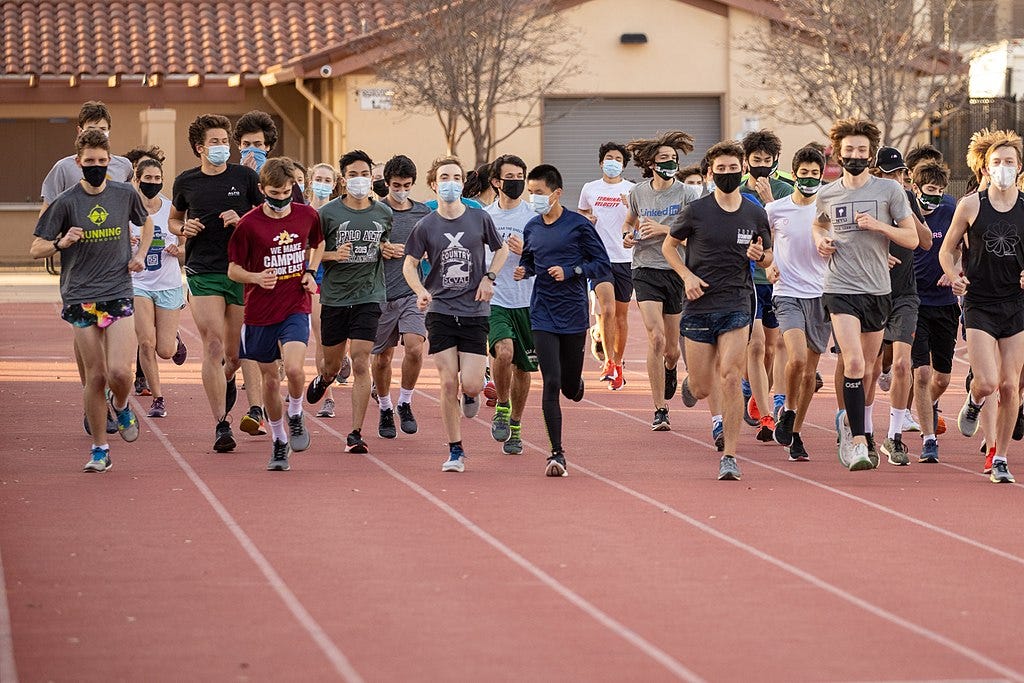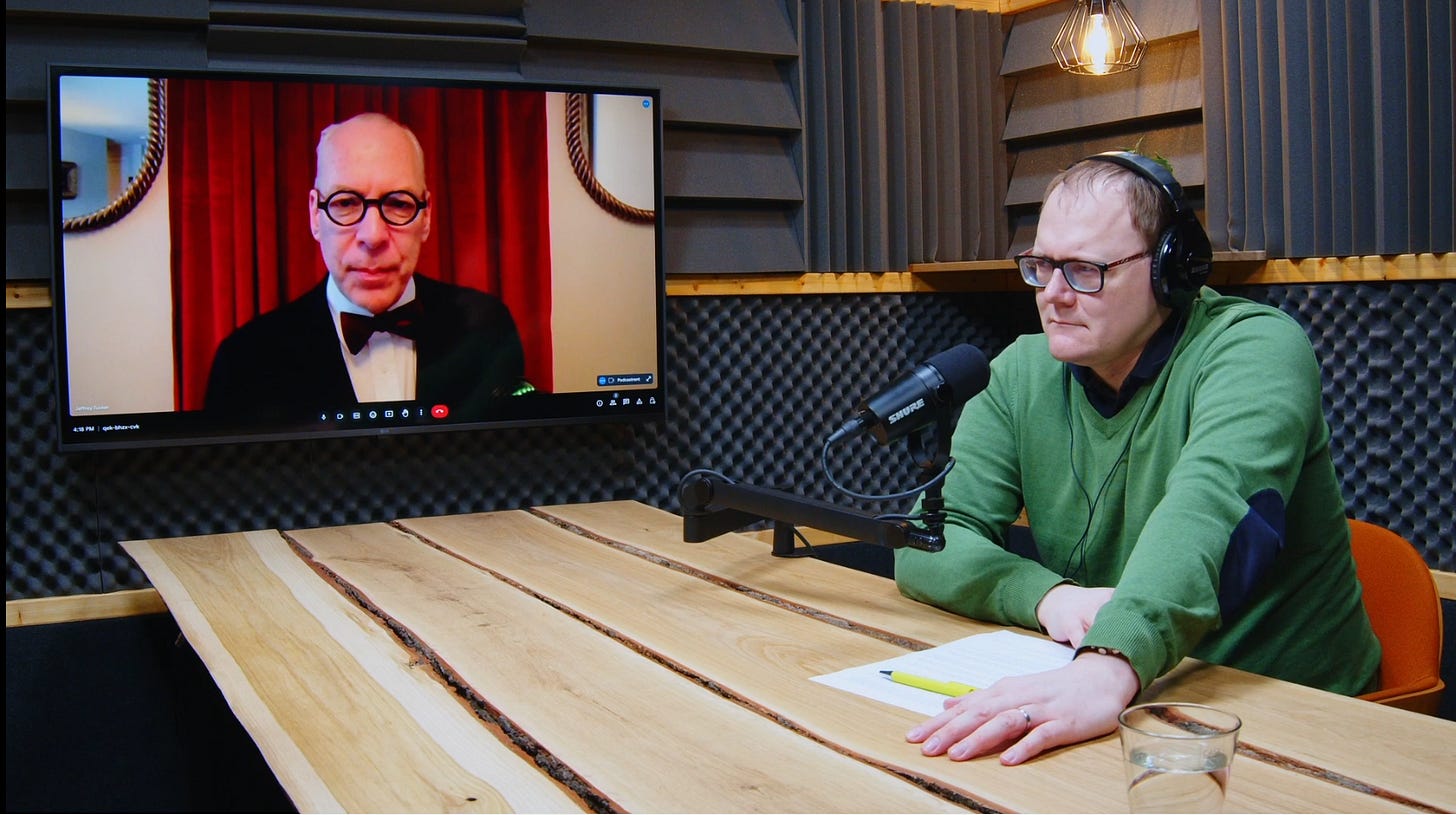Jeffrey A. Tucker's Take on the Pandemic, Its Aftermath and the Struggle We're in Now
Jeffrey Tucker explains the essence of the 'pandemic planning industry' and the rise of a corporate system in which big business and governments increasingly control people's daily lives.
“Human beings don't really like to live in cages. That's not our favorite thing to do. We try to get out of them once we realise we're in a cage,” Jeffrey Albert Tucker, a well-known US libertarian thinker and author, founder and president of the Brownstone Institute, says in an interview with us.
The building of such a cage by the powers that be has been the context in which we have lived during recent years. Under the pretext of curbing the spread of a virus, people were restricted in their movements, forced to wear masks, or coerced to get vaccinated under the threat of losing their jobs. Countries used police force to enforce these senseless rules.
Of course, the declaration of the arrival of the 'global boiling era' can be seen as a continuation of the same cage-building act, with the propagated climate emergency used as a pretext to start restricting human activity again. No wonder those who fear being the first to face devastation by such 'green transition' policies – farmers, for example - are out in the streets protesting again in many parts of the world.
This cage, of course, also means an ever-expanding censorship machine, whereby the state, with the help of a handful of big companies that run social media platforms, the Big Tech, can decide what information we can share, what we can talk about and what should be treated as 'misinformation', whether or not it is actually false.
Tucker says this development was not surprising to him and is directly linked to the Covid pandemic. “I knew this from the start on March 12, 2020 (the day a state of emergency was declared in the US due to Covid-19 - HS). I knew the lights had gone out and the next 10 years, 20 years, would be filled with struggles to regain what was being taken away from us,” he says.
Tucker: I had warned it could happen
Tucker realised this not because of his clairvoyant powers but had in fact warned specifically of such a threat – the possibility that, by referring to the spread of a viral disease, the authorities would take up the power to start significantly restricting human freedoms. He had warned that the authorities had too much power, which should be curtailed for fear of abuse. He also warned that the laws allowed this power to be used to a great extent, for example by invoking the threat of a pandemic. “I knew for sure that this was happening. It was for me the saddest day of my life because I never wanted this to happen. I had warned that it could happen. I never believed that it would happen,” he says.
Most people did not anticipate that an infectious disease could become a pretext for a major curtailment of personal freedoms and restrictions on one's way of life. Particularly if it was a disease for which the mortality rate was effectively zero outside a very limited risk group. The pre-vaccination Covid-19 infection fatality rate (IFR) in the 0-19 age group was 0.0003%. In the age group of 20-29, it was 0.003%. In the 30-39 age group 0.011%. In the 40-49 age group 0.035%. And in the 50-59 age group 0.129%. It was only in the 60-69 age group that it made a noticeable leap, reaching 0.501%. Covid-19 has always been and is comparable to, say, seasonal influenza and that was of course known since the beginning of the pandemic in 2020. However, the general public was left with the impression of a novel and exceptionally deadly disease that had to be fought against with all conceivable and unthinkable measures.

According to Tucker, there is nothing surprising in the fact that people followed the media and believed what the experts were saying. He also cites past experience as an example, where one of the consequences of any major events or confrontations has been to restrict people's rights and freedoms – it is always said that it is for their own good. During the Cold War, he says, the pretext for restricting rights was the need to defeat the main adversary, the Soviet Union. After that it was China. In the early 2000s, the threat of terrorism came, making it more difficult to travel because of tighter security at airports. More importantly, the ability of the US secret services to track people increased and the process became much easier for them.
However, justifying tyranny on the basis of the spread of an infectious disease had not happened for hundreds of years, Tucker notes. “People were not prepared for it. This is why you believed. In your whole life, nobody had ever said anything like – 'Oh, here's a dangerous new virus and you have to stay home and stay safe and make the workers and peasants bring you groceries'. That had never happened, so you were predisposed, as were most people, to think – 'well, there is no way they'd be saying such crazy things unless they knew something, unless there's something true to it'. So we tended to go along with what they were claiming,” Tucker explains.
He admits, however, that he was somewhat mistaken in his own assessment of the situation, believing that it was primarily the authorities' desire to use the virus as an excuse to suppress individual freedoms and restrict people's rights. “I missed the element of private corporate interest that was driving this. The digital media wanted everybody sitting at home and streaming their platforms. Learning companies wanted the schools closed, so they could show that you can teach all the kids online. Media companies wanted everybody glued to their content and giving them boosting by their advertising dollars. But most importantly – and this is the part that it took me a long time to realize – the driving force behind the entire thing was the desire for pharmaceutical companies to distribute a new shot and within that new shot would be a new platform technology, a kind of software for the human body that they could update anytime they wanted with any new pathogen,” Tucker says.
The pandemic planning industry
According to Tucker, such a pandemic was being prepared for well in advance under the leadership of influential agents. “This excuse had been cooked up over 15 years, funded very heavily by Bill Gates and pharma companies. And governments were just itching for a chance to try it," he says. According to him, there was an attempt to build up a similar panic in 2009 over swine flu, and even earlier. Tucker recalls that lockdown policies were already used in some parts of the world during SARS-Cov-1 in 2003 – for example in Singapore and in some places in Canada. But, by and large, such methods, or their advocates, were not taken seriously in the past. “We have no historical record of any kind of lockdowns somehow curing a pathogen. That just doesn't make any sense. All pathogens that ever existed, continue to exist. You can't make them go away, that's preposterous. And we knew this all from scientific literature,” Tucker says.
Considerable efforts were made over the years to change this attitude and to ensure the broadest possible support for coercive policies from scientists and experts. Those making this effort, the same stakeholders in the process, are what Tucker calls the ‘pandemic planning industry’. One of the key influencers of this industry is billionaire Bill Gates, founder and principal owner of Microsoft, a successful computer software company. The tycoon is portrayed as one of the world's biggest philanthropes, fighting disease, climate, poverty and other major problems the world is or supposedly is facing. Through his Bill & Melinda Gates Foundation, he is one of the biggest donors to the World Health Organization (WHO), funding projects related to vaccines, for example. What is less talked about is his business interests in the same areas that he constantly talks about as looming threats and problems that need immediate solutions. Covid vaccines, for example, were no exception, and the Gates Foundation made hundreds of millions of dollars by investing in them.

At the same time, Gates has risen to the status of a top expert on viruses, vaccines, climate, and other areas of his commercial interests, interviewed by the world's leading media on these topics. During the pandemic, for example, it was no longer considered very strange by the majority of people that a former software salesman had become an expert on viral diseases and vaccines, while top scientists who had opposed the panic were vigorously vilified and censored.
Years of lobbying and buying up science
Tucker notes that it took Gates years to build up his influence and find supporters for his ideas. Gates' idea to fight viruses in the real world came from his previous experience, Tucker says, of fighting computer viruses that had been a major blight on his Windows platform and had damaged his business. To combat the viruses, software was developed that could detect and destroy them. As viruses changed, the software could be updated accordingly. “Bill Gates took from this the idea that you should do the same thing to the human body. So the human body is afflicted with various viruses that would hit it from the outside and make it sick just like computer viruses make your computer's hard drive sick. And just like the antivirus software would protect against these viruses, we need a biological agent, a vaccine, that we would get into our body that would deflect against that virus and therefore cure us,” Tucker explains.
The solution was to be provided by mRNA vaccines - a platform that was rolled out in the form of Covid vaccines during the pandemic. Of course, Tucker points out, such vaccination could not work in the middle of a pandemic, because it would not destroy the virus, but would make it escape and only create new strains of the virus, while people's immune systems would be weakened by the continuing booster shots. That is exactly what happened, although all the problems were blamed, as we remember, on people who did not want to be injected with the medicine based on this new technology.
Significantly, just 15 years earlier, the scientific community had scuppered plans to constantly inject people to protect them from viruses. "By this time Gates was very, very rich, so he began to buy out epidemiological departments, and scientific journals. He gave a lot of money to the universities and preached his ridiculous theory," Tucker says. So scientists were essentially won over to their side through grants and subsidies, and science journal editors were replaced. Tucker notes that the pharmaceutical industry also saw this as a great money-making opportunity. And rightly so, as we witnessed during the Covid pandemic – both Pfizer and Moderna made billions of dollars from mRNA vaccines.
At the same time, according to Tucker, with funding from the United States, many laboratories around the world were working on viruses and conducting 'gain of function' experiments. When the SARS-Cov-2 leaked from the labs of the Wuhan Institute of Virology in 2019 – Tucker notes that this probably happened as early as October 2019, when the Military World Games were held in Wuhan and the virus was immediately spread around the world by the participants – it was sometime later that it started to be talked about as a new and dangerous disease about which little was known. The media was stirring up widespread panic. This in turn gave the authorities in the various countries the opportunity to respond to the events with states of emergency, lockdown policies, and coercive measures. The extraordinary situation provided an opportunity to introduce mRNA vaccines. “This technology was never able to gain approval in normal times, because it was too risky. Nobody really knew what was going to happen when they started using mRNA technology. How far it would travel in the body? What the adverse events of it would be? So it couldn't get approval. The emergency was a great chance for them to bypass all the normal processes of approval and then get it approved basically all over the world,” Tucker notes, adding that one of the goals of the lockdown policy was to support vaccination. “The reason for the lockdowns was to stop the spread of the virus so that when the vaccine came along, it could get full credit for having cured everybody from this terrible disease. That was the idea,” Tucker says.

Different countries also used varying degrees of coercion to get people to get vaccinated - from being fired from their jobs to being forced by new laws. All this was done ostensibly because of the need to limit the spread of the coronavirus and the danger posed by the disease, when in fact the disease posed a real threat to a tiny fraction of the human population, and the fact that these vaccines did not limit the spread of the disease could essentially be seen from the moment they were introduced.
The consequences of the pandemic: a new ugly reality
"This universal denying of human rights and human liberties for so many months, and in some places even years, has massively disrupted the functioning of our economies and our social order and the human personality itself," Tucker says. “The world is fundamentally different now than it was before. We have a different ethic and a different expectation. We are no longer secure in our property rights or our expectations for having normal liberties,” he adds.
As a simple example, he cites the fact that several of his friends are now afraid to travel for fear of being trapped in a foreign country where a state of emergency and lockdown measures might be declared. It all has become a reality.
But of course, this is a small thing next to the problems now affecting the whole of society, which Tucker says are a direct consequence of the pandemic policy. For example, the massive inflation caused by the huge money print has made people much poorer. Millions of small businesses were wiped out as a result of the pandemic policies that ordered them to close themselves down as "non-essential”. Drug and alcohol use has increased. There is a big learning loss because of school closures, and children and teenagers have problems with their mental health. "If you take away people's purpose of existence, their job or school or whatever they do routinely and force them to stay home and do absolutely nothing but watch movies on their laptops, you're going to drive them to drink and substance abuse and weight gain,” Tucker comments, adding that in the United States, these irrational policies also caused a huge wave of internal migration as people tried to get out of the states ruled by the worst 'tyrants' and go elsewhere.

According to Tucker, the rise in crime and violence is also the result of pandemic policies. “The force that was used to force you to stay home, force you to wear a mask, force you to get the shot – all these actions of force gave a very bad example to the population on how to interact with each other,” Tucker argues, adding that in a sense the destructive wars that are raging in the world today are also a continuation of such policies. “There's a great deal of psychological trauma essentially all over the world. A great deal of unhappiness and anger at governments, because people are starting to realize that the governments have lied to them. They lied to them the whole time and they've not apologised,” he notes while acknowledging that no apology is, of course, to be expected, because why would anyone want to voluntarily incur the wrath of people on them? Rather, it is a matter of moving on and pretending that nothing has happened.
An effective censorship machine
In addition, widespread censorship has reared its head. Tucker has experienced this both personally and through the content of the Brownstone Institute which, for example, had videos instantly taken down from YouTube. But by the same token, Facebook, LinkedIn, Google, et al are restricting the circulation of their posts. “The censorship is overwhelming. To the point that the internet really is a very different place now than it was 10 years ago. It used to be about increasing and broadening the information you could get and now it is about restricting and making sure you think the right things. That's the whole driving ethos of the internet now,” Tucker says.
He says that it's not surprising, of course, that the same pandemic planning industry got the Big Tech and their big social media platforms on board. “They don't know anything about science. They kind of believed the story that the way to deal with viruses is to inoculate the population against them just like Norton Antivirus stopped viruses in the computer. So they're kind of stupid people,” Tucker says.
Of course, this censorship was not and is not just about health issues, but is also clearly political or ideological. Take, for example, what is currently happening in Brazil, where Elon Musk's X is under threat of being shut down because of Musk's refusal to close the accounts of some opposition politicians and pro-opposition commentators. Musk's X is the current exception in this censorship field, but before he acquired the then-still-named Twitter in the autumn of 2022, it was the most effective censorship machine of its kind, getting direct instructions on what kind of speech should be deemed inappropriate from the US government.

However, Tucker does not see this situation of censorship lasting indefinitely and cites the example of Facebook founder Mark Zuckerberg's Threads, a similar platform that was launched last year to compete with Musk's X. Threads failed to gain popularity and lost 85% of its original users in the first few weeks. Among other reasons, it seems that as the platform publicly confirmed that it was applying its usual censorship methods, the users did not care to stay there. “The problem is that people don't want to be propagandized. They prefer an open uncensored internet to a censored internet and what that means is that the platforms that are not controlled are the ones that attract the most users and therefore the most advertisers and therefore the most profits. The ones that are most compliant with the government censors, lose,” Tucker says.
The mainstream media also loves censorship because it benefits them, Tucker adds. “Censorship harms their competition and grants them a kind of control over spreading information. That's why The New York Times loves censorship and why all the mainstream media are for control of information flows because they're being outcompeted by all the new media. They're using censorship as a kind of regulatory tool against their competition. That's why they're for it and that's why they're working very closely with government,” Tucker says. It's worth thinking about this when reading another fact-checking piece somewhere when it seems that the facts are being presented in a slanted way, or at least in a way that seems to justify the state and its decisions on limiting people's liberties.
Tucker says that in such a situation, it is not surprising that public authorities, big corporations, and important institutions, such as the media, have lost the trust of people. The greatest danger of our times, he says, is a corporate system in which big business and governments, with the former’s help, increasingly control people's daily lives. “I think it is really important for people to understand that we are no longer dealing with the debate between capitalism and socialism. About that, we were encouraged to think in the 20th century,” he says. “Now the real threat is corporatism. The merger of big business, big science, big pharma, and big government. And they are all coming together to oppress everybody else,” he adds.
More broadly, the Brownstone Institute, which Tucker founded in May 2021 and which brings together a wide range of authors from different fields and from both the right and left wings of politics, is also designed to critically assess the current situation and oppose corporatism. The direct impetus for the founding of Brownstone came from Tucker's realization, during the Covid pandemic, that the powers-that-be could peacefully set about destroying people's freedoms and rights, while the institutions that were supposed to prevent this, such as the press or academia, went along with the process. As did the people who had previously claimed to be uncompromising defenders of freedoms, but now shut down during the pandemic. “Libertarians, at least in the US – and I am pretty sure that Europe is in the same situation – completely failed to speak out at all. They couldn't even understand the problem. I mean it was a scandal for the ages that these famous libertarians found themselves completely confused by the presence of an infectious disease,” he says.





The alert and competent specialists in Infectious Disease medicine knew about SARS and MERS and began to plan a variety of responses in the likely event that a worse and longer lasting outbreak of lethal infectious disease was possible and given time, likely.
What interests me most in these paranoid fantasies about the time when their expert knowledge turned out to be true is that we all underestimated just how much the human race is a social species and just how crazy so many would become by having to deal with quarantine, physical distancing and isolation. I have noted that when one of my cows gets separated from the herd it becomes aroused and fearful and desperately seeks to run to rejoin it. The exact same thing happens with my goats; stops eating, searches all around bleating and tense and full speed running to where it thinks the others might be.
I thought better of humans, how wrong I was and I suppose part of that is because I was bullied, adjusted to being alone and adapted to enjoy my own company in peace and quiet.
We healthcare and political people will have to adjust our responses taking this into account.
Poor pathetic little sheep!
It's nicely written but very long for this complex problem to be described.